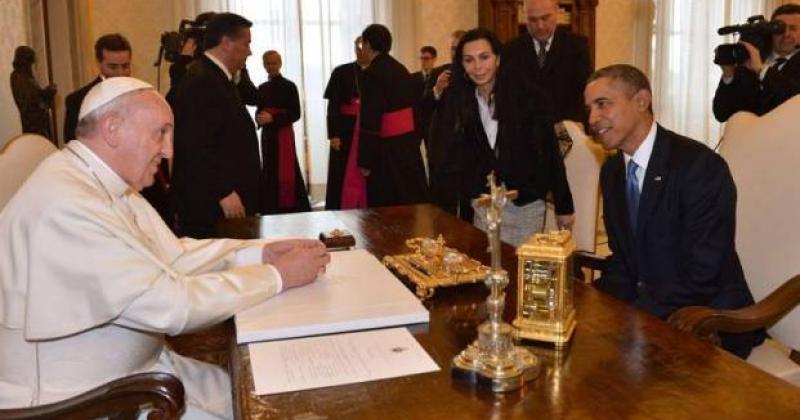A week before the Pope is due to travel to the US, the “confidential” documents of the US administration reveal that the country is fully in tune with Francis’ objectives.
“Pope Francis’ diplomatic legacy is still being built, but “pastoral conversion”, which is the hallmark of his pontificate is taking shape in important ways. The Pope’s grip on the world stage means his pastoral actions will have widespread political implications.”
This prediction - which appears in the White House and State Department’s documents in preparation for the first meeting which took place between the Pope and President Obama in March last year, in the Vatican - has certainly turned out to be correct. The texts, classified as “sensitive” and “confidential”, which Italian newspaper La Stampa was able to see, help explain the alliance that formed between the US and the Holy See. Washington hopes to strengthen this alliance when Francis arrives on US soil on 22 September for his first visit there so far.
Issues of common interest
The reports presents Obama with a description of Bergoglio and the Vatican structure and then deal with specific points of common interest and areas of potential co-operation: fight against poverty and hunger, environment, war in Syria, peace negotiations between Israel and Palestine, Cuba, human trafficking. Then there are the building blocks for the press availability session, in other words, suggested topics that could be touched on during the press conference.
The document on the fight against poverty and economic inequality, states that since his election in March 2013, Pope Francis has attracted the world’s attention with his unique leadership style, evident humanity and empathy and devotion towards the poor. Although he has reinforced the traditional teachings of the Church, he has also made it very clear that hot social issues such as abortion and same-sex marriages should not overshadow other areas of pastoral concern, including care for the poor, the sick and the needy. Here is the first topic on which the two find common ground: a Pope who changes priorities, placing so-called “life issues” at the very least on a par with other social concerns, which the White House fully shares. In relation to this, the report recalls the Apostolic Exhortation “Evangelii Gaudium” which calls for the “eliminat[ion] of the structural causes of poverty” and denounces a “financial system which rules rather than serves”. Obama’s advisors note that “some observers saw this document as a challenge to the excesses of capitalism,” but they contested the Marxism accusations directed at the Pope: “The Pope’s ideas regarding the economy are rooted in thousands of years of Catholic doctrine. Human wellbeing is determined by moral choices and the Church must always focus on defending the poor. This emphasis on human dignity, is a common language among Catholics but Francis uses it in striking ways. He gives personal examples. But the Pope still refers back to tradition, from the “Compendium of Social Doctrine” published by John Paul II in 2004 to “The Church in the Modern World” of 1966.
The environment
On the subject of the environment, the White House noted that the Vatican sees the protection of the environment as a “moral duty” and places a great deal of hope in the new encyclical which has been strongly criticised by US conservatives. The Holy See sees a strong link between the environment and concerns about economic policy and Pope Francis’ next apostolic exhortation will draw attention to this link. The Vatican has publicly recognised the serious and potentially irreversible effects of global warming.
On the subject of Syria, Obama’s advisors share the approach that focuses first and foremost on helping people in order to keep them away from extremism. Regarding the Middle East, they agree on supporting direct negotiations and a resolution of the conflict between two sovereign states. Pope Francis has, on various occasions, supported the efforts of the US to revive talks, which the Catholic Secretary of State, John Kerry had led for months, with great determination.
The sanctions on Cuba
The document on Havana anticipates the mediation the Holy See was to set in motion in those very months: “We respect the Vatican’s point of view regarding the economic sanctions the US has imposed on Cuba but we note that despite these sanctions, the US is one of the island’s main trade partners. We are Cuba’s first or second source of food imports every year.” The document goes on to say that the root of the island’s problems is not the embargo but in the Cuban government’s politics and action. As long as it continues to limit economic freedom in fear of losing its monopoly on political power, the country will have problems. The US said it proposes freedom of assembly, pf speech and access to information and the internet. Positive action by the government in these areas inevitably result in a closer interaction with the US, including increased trade and travel. A couple of months later, the Vatican hosted the secret talks that in Rome, which led to the historic re-establishment of bilateral relations between Washington and Cuba.
There was also very strong consensus on the fight against human trafficking, a “modern form of slavery” that exploded into the migration phenomenon, initiatives to combat hunger and the persecution of religious minorities. “Francis has demonstrated the ability to capture the attention of Catholics and not on the world scene. In situations of conflict, he will continue to be a voice for reconciliation. Concern over the persecution of Christians will push the Church towards pragmatic policies. Where religious freedom is restricted, as it is in China, Francis will seek pastoral opportunities to reach out to faithful, avoiding clashes.” A big chunk of this agenda is already a reality; everything else will be discussed in Washington next week.
